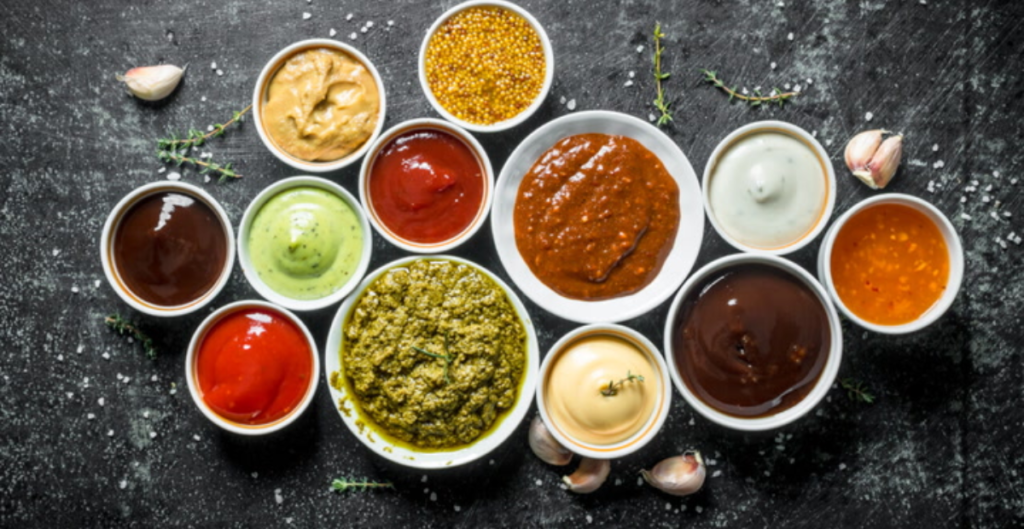Condiments on the Carnivore Diet: A Comprehensive Guide
The carnivore diet has gained significant traction among those seeking improved health, weight loss, and mental clarity. Rooted in the principle of consuming only animal-based products, the diet eliminates processed foods, fruits, vegetables, grains, and plant-based oils. While this simplicity is one of the diet’s strengths, it can also pose challenges—particularly when it comes to flavour.
This raises an important question: Can condiments be included in the carnivore diet? If yes, which ones? Let’s explore this topic in detail to provide a definitive guide on using condiments while staying true to the carnivore philosophy.
Understanding the Carnivore Diet
The carnivore diet focuses on eating nutrient-dense animal-based foods such as:
- Meat: Beef, lamb, pork, chicken, and organ meats.
- Seafood: Fish, shellfish, and crustaceans.
- Animal Fats: Tallow, lard, duck fat, and butter.
- Eggs: Whole eggs and egg yolks.
- Dairy (Optional): Cheese, heavy cream, and ghee for those who tolerate dairy.
This extreme elimination diet excludes all plant-based foods, with the idea that plants may contain anti-nutrients or compounds that can disrupt health. However, when it comes to condiments, the rules can get a bit murky. Let’s delve into whether and how condiments can fit into this strict dietary approach.
The Role of Condiments in a Carnivore Diet
Condiments serve two main purposes:
- Flavour Enhancement: They add variety to meals, preventing food fatigue.
- Nutritional Support: Certain condiments provide essential nutrients like sodium and fats, critical to the carnivore diet.
However, many commercial condiments are loaded with non-carnivore ingredients like sugar, vegetable oils, thickeners, and preservatives. The challenge lies in identifying condiments that align with the carnivore diet’s principles.
Types of Condiments on the Carnivore Diet
1. Fully Carnivore-Friendly Condiments
These condiments align completely with the diet and can be used freely:
- Salt:
- A cornerstone of the carnivore diet, salt is essential for maintaining electrolyte balance. Since the diet eliminates processed foods (a major source of sodium), salting your meals is crucial.
- Use high-quality options like Himalayan pink salt, sea salt, or Redmond’s Real Salt for added trace minerals.
- Butter and Ghee:
- Both are animal-based fats that enhance the flavour and texture of dishes.
- Opt for grass-fed varieties to maximize nutritional benefits, such as higher omega-3 fatty acids and conjugated linoleic acid (CLA).
- Tallow, Lard, and Duck Fat:
- These rendered animal fats can be used for cooking or as dipping sauces. They add richness to meats and are nutrient-dense.
- Egg Yolks:
- A versatile ingredient, egg yolks can be used as a topping for steaks or blended into sauces.
- Bone Broth:
- While more of a liquid than a traditional condiment, bone broth adds a savory flavor and provides collagen, gelatin, and minerals.

2. Condiments That May Be Acceptable in Moderation
These condiments are not strictly carnivore-compliant but may be acceptable for those following a relaxed version of the diet:
- Vinegar:
- While derived from plants, small amounts of apple cider vinegar or white vinegar can be used for flavour or digestive support.
- Spices:
- Spices like black pepper, garlic powder, and paprika are technically plant-based but are often used sparingly to add flavour.
- Mustard:
- Pure mustard made with mustard seeds, vinegar, and salt can be acceptable if it contains no added sugars or preservatives.
- Cheese-Based Sauces:
- Carnivore-friendly cheese sauces made from heavy cream, butter, and cheese can add richness to meals. Avoid pre-packaged versions with starches or thickeners.
3. Condiments to Avoid
The following condiments are not suitable for a strict carnivore diet due to their plant-based ingredients and additives:
- Ketchup:
- Contains tomatoes, sugar, and preservatives.
- Soy Sauce:
- Derived from soybeans and often contains wheat, making it incompatible.
- Hot Sauce:
- Made from chilli peppers, vinegar, and often sugar or preservatives.
- Mayonnaise:
- Store-bought varieties typically contain seed oils like canola or soybean oil, which are not allowed.
Homemade Carnivore-Friendly Condiments
Making your condiments at home ensures full control over ingredients. Here are some easy, carnivore-compliant recipes:
1. Hollandaise Sauce
- Ingredients:
- Egg yolks
- Butter
- salt
- Method:
- Melt butter in a saucepan over low heat.
- Whisk egg yolks in a bowl, then slowly drizzle in melted butter while whisking.
- Add salt to taste and serve over steak or eggs.
2. Bone Marrow Butter
- Ingredients:
- Bone marrow
- Butter
- salt
- Method:
- Roast bone marrow until soft.
- Blend with softened butter and salt.
- Use as a spread or steak topping.
3. Tallow-Based Dipping Sauce
- Ingredients:
- Beef tallow
- Garlic powder (optional)
- Salt
- Method:
- Melt tallow in a saucepan.
- Add salt and optional garlic powder for flavour.
- Use as a dipping sauce for grilled meats.
4. Carnivore Pâté
- Ingredients:
- Chicken liver
- Butter
- Salt
- Optional spices (nutmeg, white pepper)
- Method:
- Sauté chicken liver in butter until cooked.
- Blend with more butter and optional spices until smooth.
- Use as a spread for meats or eggs.
Must Read: 13-Day Japanese Diet Plan for Weight Loss
Health Benefits of Condiments on the Carnivore Diet
Properly chosen condiments can:
- Enhance Nutritional Intake: High-quality salts and fats provide essential minerals and fatty acids.
- Support Electrolyte Balance: Sodium is vital for preventing dehydration and muscle cramps, especially during the initial adaptation phase of the carnivore diet.
- Improve Meal Satisfaction: Adding flavor and variety to meals helps sustain adherence to the diet.
Condiments vs. Flavor Simplicity
One of the core philosophies of the carnivore diet is simplicity. The elimination of complex flavour profiles is believed to help reset the palate and reduce cravings for hyper-palatable processed foods. While condiments can add variety, over-reliance on them might interfere with this process. Finding a balance is key.
The Debate Over Flexibility
There is ongoing debate within the carnivore community about whether any plant-based ingredients should be included. The decision ultimately depends on individual goals and tolerances:
- Strict Carnivores: Avoid all plant-derived ingredients and focus solely on animal-based condiments.
- Relaxed Carnivores: Incorporate small amounts of plant-based condiments like vinegar or spices without compromising overall progress.
Tips for Adapting to Condiment-Free Meals
If you’re transitioning to a strict carnivore diet and struggling with flavour monotony, consider these strategies:
- Experiment with Animal Fats: Rendered fats like duck fat or tallow can enhance the richness of meals.
- Use Organ Meats: The liver, bone marrow, and heart have unique flavours and nutrient profiles.
- Try Different Cooking Methods: Grilling, roasting, and slow-cooking bring out natural flavours in meats.
- Focus on Freshness: Freshly cooked meats often have stronger, more appealing flavours.
Carnivore Diet and Keto: A Comparison of Condiments
The ketogenic (keto) diet allows for a wider range of condiments, including plant-based oils, spices, and sweeteners, as long as they are low in carbohydrates. In contrast, the carnivore diet’s stricter approach excludes these entirely. This difference reflects the carnivore diet’s focus on ancestral eating and the total elimination of plant compounds.
Condiments Across Cultures: Historical Perspectives
Condiments have been used for centuries to preserve and enhance food. In ancient times, salt was prized as a preservative and flavour enhancer, often traded like currency. Animal-based fats like lard and tallow were staples in many traditional diets, while bone broths and organ-based sauces were common in indigenous cuisines. Exploring these cultural roots can inspire carnivore-friendly condiments.
Potential Pitfalls of Condiments on the Carnivore Diet
- Hidden Additives: Even seemingly simple condiments like mustard or vinegar can contain hidden sugars, seed oils, or preservatives.
- Over-Reliance on Non-Carnivore Ingredients: Incorporating too many plant-based condiments may dilute the benefits of the carnivore diet.
- Palate Dependence: Overuse of condiments can prevent the palate from adapting to the natural flavors of animal-based foods.
Conclusion
Condiments can be included in a carnivore diet, but they must align with its principles of consuming only animal-based products. Fully compliant options like salt, butter, and tallow enhance flavour and provide essential nutrients. Moderation-friendly options like mustard or vinegar may suit those following a more relaxed approach, while commercial condiments like ketchup and soy sauce should be avoided entirely.
By focusing on high-quality, nutrient-dense ingredients and experimenting with homemade recipes, you can enjoy a flavorful and satisfying carnivore diet without compromising its core philosophy. Whether you’re a purist or prefer some flexibility, mindful choices can ensure a sustainable and enjoyable carnivore journey.



